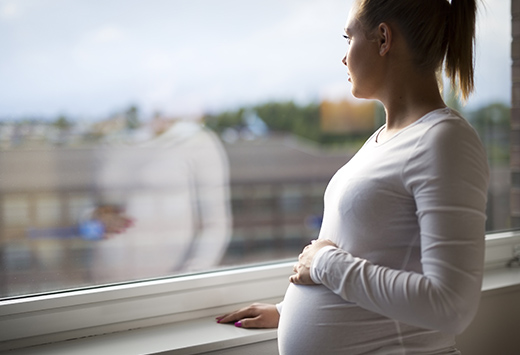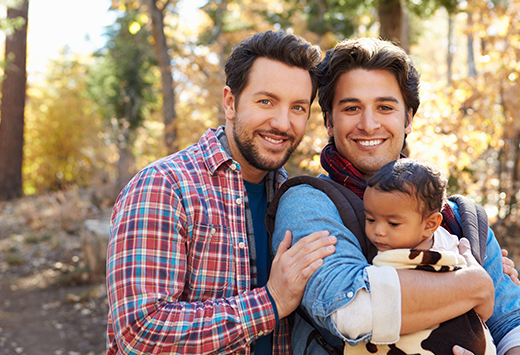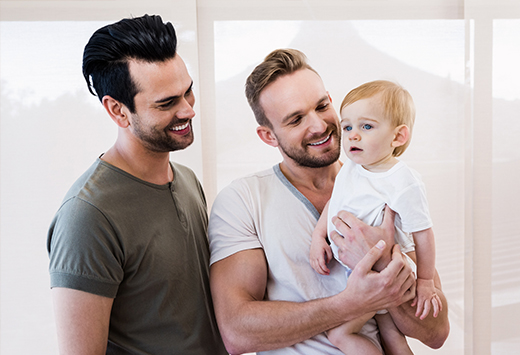A beautiful thing about modern society is that families are increasingly diverse and more often coming in all shapes and sizes. This means that many LGBTQ+ couples are creating or growing their families through adoption. At LifeLong Adoptions, we are proud to specialize in assisting the LGBTQ+ community through the adoption process. Read on to discover more about the history of same-sex adoption in the United States, the process for LGBTQ+ families to adopt, tips for adoptive parents, and the importance of inclusivity throughout the adoption process.
What is the history of same-sex adoption in the United States?
The history of same-sex adoption in the United States is brief. It began notably in the 20th century with the inception of the civil rights movement. Since this time, the LGBTQ+ community has been fighting for and gaining rights, including the right to adopt.
Because of the structure of the legal system in the United States, the first step for same-sex adoption becoming legal was through state laws tied to making same-sex marriage legal. In 2003, Massachusetts was the first state to legalize gay marriage, which paved the way for same-sex adoption to follow suit.
In 2015, the monumental Obergefell v. Hodges case was taken to the Supreme Court to challenge laws against gay marriage in the United States. It was ruled that same-sex marriage is a constitutional right, which thereby made it legal across all 50 states. This was also a significant ruling for same-sex adoption because it allowed couples to adopt in states where there are marriage requirements related to sexual orientation.
It is important to recognize that the path to the LGBTQ+ community realizing their rights to marriage and family was very much fought for and hard earned. When discussing same-sex adoption, remembering those who carved a path for individuals to marry who they love and adopt children is essential. Breaking barriers is intrinsically tied to the history and future of LGBTQ+ adoption.
Are there adoption professionals who specialize in LGBTQ+ adoption?
Yes! As same-sex adoption has become more common in the United States, there are more and more adoption professionals specializing in LGTBTQ+ adoption and who value inclusivity throughout the adoption process. LifeLong Adoptions is one such example of an adoption service provider that celebrates inclusivity with regard to adoption and focuses primarily on assisting LGBTQ+ couples achieve their family dreams. We are proud to support families of all shapes and sizes and help them achieve their dream of creating a family by offering personalized support as they navigate the adoption process.
What is the process for LGBTQ+ adoption in the United States?
LGBTQ+ prospective adoptive parents often feel like they will face additional barriers and have a more difficult time throughout the adoption process because of their sexual orientation. The good news is that when it comes to domestic adoption, the process does not change according to the sexual orientation of the prospective adoptive parents. There is no additional scrutiny on the prospective adoptive parents during the home study process and rest of the steps in the adoption process regardless of their sexual orientation.
As LGBTQ+ adoption becomes more common, more birthmothers are choosing to place their children with LGBTQ+ families. This could potentially reduce adoption wait time; however, like any adoption, that depends on various factors, including the home study, state laws, and the amount of time it takes to make a connection with the birthmother. One thing to keep in mind is that no matter the other challenges adoption may bring, same-sex prospective adoptive parents can rest assured that they do not have to jump through any additional hoops in order to finalize the adoption process.
LGBTQ+ Adoption According to the Statistics
To gain a better picture of the landscape of adoption for same-sex couples, we can take a look at the statistics. A groundbreaking study published in 2007 by the Williams Institute and Urban Institute illuminates the landscape of LGBTQ+ adoption and provides insight into the increasing role of LGBTQ+ individuals in modern adoption. Other great sources for statistics on LGBTQ+ adoption includes the United States Census Bureau, and academic institutions.
Some interesting statistics include:
- An estimated two million LGBTQ+ individuals are interested in adopting.
- In 2019, 22.5% of female same-sex couple households had children under 18 present, compared with 6.6% of male same-sex couple households.
- LGBT adoptive parents are more likely to adopt transracially.
- California, New York, Massachusetts, Texas, and Washington are the states with the highest number of children in LGBTQ+ households.
- The US Census Bureau revealed that according to their data, same-sex couples are three times more likely to have adopted children, and 20% of same-sex couples have adoptive children compared to their opposite-sex couple peers
- Same-sex parents are raising four percent of all adopted children in the United States (note that this statistic is most likely higher now as the study it originates from was published in 2007).
Dealing with Stigma as a LGBTQ+ Adoptive Parent
There are a few challenges that LGBTQ+ families face when navigating the adoption process. The biggest challenge and worry we see is fear of stigma or prejudice. Unfortunately, there are still some people who prescribe to the outdated notion that children solely benefit from being raised by two heterosexual parents. While we know this isn’t true, dealing with this antiquated belief or fear of this stigma or prejudice can be a huge challenge for LGBTQ+ prospective adoptive parents. Families may also fear that as their child grows, they may face criticism, misunderstanding, and ridicule. While this is a possibility, because LGBTQ+ families are visible and present in society, people and children are becoming more accepting of different types of families.
Tips for LGBTQ+ Adoptive Parents
- Choose a LGBTQ+ friendly adoption professional.
Choosing the right adoption professional is an essential part of successfully navigating the adoption process, but this is especially important for LGBTQ+ prospective adoptive parents. Working with an LGBTQ+ friendly adoption professional will ensure you are properly supported throughout the process.
You can find LGBTQ+ adoption professionals through traditional research methods. You could ask other same-sex couples you may know who adopted for a recommendation, or you can also try reaching out to online support groups to get information about qualified adoption professionals who specialize in LGBTQ+ adoption. We recommend choosing a few prospective adoption professionals to research and interview before choosing to to ultimately work with.
- Consider all your adoption options.
Prospective adoptive parents have a few options for adoption, including private domestic infant adoption, international adoption, and foster-to-adopt. If you’re considering an international adoption, you may encounter laws that would prohibit you from adopting in certain countries that are particularly conservative. For this reason, many same-sex couples pursue private domestic adoption as it is currently legal across the United States according to federal law.
- Educate yourself on state laws.
While same-sex adoption is currently legal in all 50 states, certain states may have different rules about joint custody and parental rights that you should know before initiating the adoption process. We recommend working with an attorney who specializes in LGBTQ+ adoption who can help guide you through the legalities of the process. You can learn more about state laws that may affect your adoption here.
- Find a supportive community.
The adoption process can be overwhelming for prospective adoptive parents, but especially those within the LGBTQ+ community who may be feeling additional anxiety. Having a supportive community and network of other families to rely on during this time can make all of the difference. For same-sex couples, it is very helpful to connect with other families who have already gone through the adoption process so you can learn from their experiences and start building your network.
- Find resources for LGBTQ+ families.
We recommend accessing resources specifically for LGBTQ+ families who are going through the adoption process or have already finalized their adoption. It is also helpful to find resources about LGBTQ+ parenting in general to learn about its challenges, joys, and everything in between. There is an abundance of resources available online, here are some to get your started:
- The Family Equality Adoption Options Handbook for the LGBTQ+ Community
- The Outspoken Voices podcast by Family Equality
- FAQ for LGBTQ+ Prospective Foster & Adoptive Families from the Department of Health and Human Services
- Some Families Podcast for LGBTQ+ Parents
- Family Law Directory by the LGBTQ+ Bar
- Raise the Future Resources for LGTQ+ families
- Resources from COLAGE
- Books on LGBTQ+ Adoption
Inclusivity & Adoption
Over the past few decades, the adoption sector has taken monumental strides in becoming more ethical and inclusive of all who want to build their families through adoption. An important piece of this is ensuring that members of the LGBTQ+ community continue to have the right to adopt and being inclusive of their presence in every aspect of adoption.
At the end of the day, an inherent and unalienable right is that of choosing to create a family through adoption. The adoption process needs to continue to be inclusive of all individuals who are able to provide a safe, loving, and healthy home to children, which especially includes the LGBTQ+ community who often turn to adoption to create their families. While it is not without its challenges, LGBTQ+ parenting is a beautiful thing and adoption is just one way in which families can be united.




